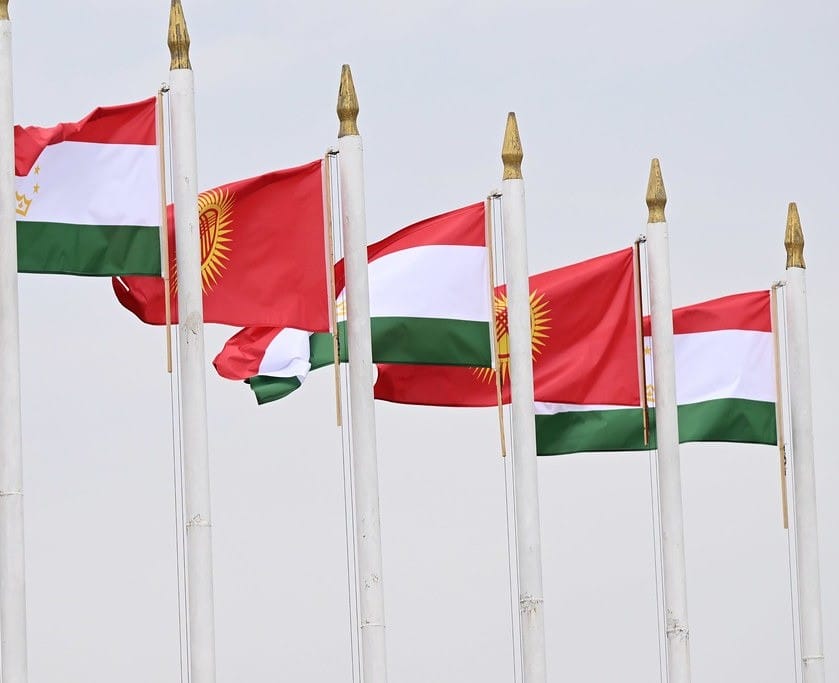BAKU, Azerbaijan, July 9. The state visit of Kyrgyz President Sadyr Zhaparov to Tajikistan on July 8 - 9 marked an important stage in the rapprochement process between the countries.
The visit demonstrated not only a willingness for dialogue but also readiness for a full-scale reboot of bilateral relations across political, economic, and humanitarian spheres. It came as a logical continuation of a series of positive developments that have occurred recently.
On March 13, Kyrgyzstan and Tajikistan signed a treaty on the state border in Bishkek, finalizing the long-standing process of delimitation and demarcation that dated back to the Soviet era. This was followed by a historic trilateral meeting of the leaders of Kyrgyzstan, Tajikistan, and Uzbekistan - Sadyr Zhaparov, Emomali Rahmon, and Shavkat Mirziyoyev - in Khujand on March 31, where they signed an agreement on the junction point of the three countries’ borders.
During extended talks with Tajik President Emomali Rahmon, Zhaparov emphasized that the current agenda is not so much conflict resolution as deepening trade, economic, cultural, and humanitarian cooperation. “We are on the verge of launching a full-scale bilateral partnership that will cover a wide range of areas,” he said.
Following the talks, the presidents issued a joint statement and signed a number of agreements, the most significant being the agreement to establish an Intergovernmental Council. This new body, to be led by the heads of government, will hold its first session in Bishkek, with the date yet to be announced.
Several other bilateral agreements were also signed in areas such as geodesy, land management, cadastre, remote sensing, metrology, standardization, tourism, environmental protection, and social cooperation. Memoranda were signed between national broadcasting corporations and between agricultural research institutions of both countries.
The chambers of commerce and industry agreed to establish a Business Council, while the ministries of economy expressed readiness to develop and implement a roadmap to increase bilateral trade and raise trade turnover to $500 million in the medium term. The foreign ministries also approved a cooperation program for 2026–2027. According to the National Statistical Committee of Kyrgyzstan, trade between the two countries grew more than fivefold year-on-year to $2.071 million from January through April 2025.
Zhaparov also proposed reviving the Supreme Interstate Coordinating Council at the presidential level, creating a parliamentary mechanism involving friendship groups and relevant committees, and establishing a permanent cooperation format between border regions in the form of a forum or regional council.
On July 9, Zhaparov met with Rustami Emomali, Chairman of the National Assembly of the Supreme Assembly of Tajikistan. He emphasized the important role of parliamentary friendship groups and committees, stating that inter-parliamentary dialogue should become a core element of stable bilateral ties. Zhaparov also held talks with Fayzali Idizoda, Chair of the Assembly of Representatives of Tajikistan, who announced the creation of a new parliamentary friendship group with Kyrgyzstan.
An investment and economic forum was also held in Dushanbe with the participation of 500 business representatives. Kyrgyzstan also showcased projects in the light and food industries, the automotive sector, agriculture, and processing at the national exhibition of products from both countries in the Tajik capital.
Transport cooperation was another key topic. Speaking at the forum, Zhaparov highlighted the importance of the China - Kyrgyzstan - Uzbekistan railway project, saying it could revive the spirit of the ancient Silk Road in a modern context. Notably, during the 12th Meeting of Shanghai Cooperation Organization (SCO) Transport Ministers in Tianjin on July 2, Tajik Transport Minister Azim Ibrohim discussed with Chinese officials the possibility of Tajikistan joining the project, opening up the prospect of a new, unified transport space in Central Asia.
The leaders also discussed expanding air and bus transportation. Air travel between the countries, suspended in May 2021, was restored between Bishkek and Khujand, and Bishkek and Dushanbe, shortly after the March 13 border agreement was signed.
The visit also focused on border issues. The Karamyk and Bordobo checkpoints were reopened, and the sides agreed to simplify border crossings and improve conditions for trade and movement of goods and services.
In the energy sector, the two presidents stressed the importance of completing the regional Central Asia South Asia Electricity Transmission and Trade Project (CASA-1000) project. A 500-kV transmission line between Datka (Kyrgyzstan) and Sughd (Tajikistan) was launched in March this year within the framework of this initiative. The project aims to export clean hydropower from Kyrgyzstan and Tajikistan to Afghanistan and Pakistan - a significant step given global trends toward green energy and sustainable development.
Humanitarian cooperation also featured prominently on the agenda. The leaders discussed supporting cultural centers, ethnic communities, educational institutions, and preserving the cultural and linguistic identities of Kyrgyz people in Tajikistan and Tajiks in Kyrgyzstan. They also reaffirmed plans to promote academic and youth exchanges, as well as cooperation between scientific institutions.
Moreover, Zhaparov held talks with Tajikistan’s Prime Minister Kokhir Rasulzoda. He emphasized that now is the right moment to implement all agreements and join efforts to elevate Kyrgyz-Tajik relations to a new level.
President Sadyr Zhaparov’s visit to Tajikistan was a major step toward strengthening the bilateral partnership. His meetings with top officials - from the president and prime minister to parliamentary leaders -demonstrated a comprehensive approach to restoring ties on all fronts. The wide-ranging discussions, from energy and trade to transport, regional, parliamentary, and cultural cooperation, highlight real opportunities for turning Kyrgyzstan and Tajikistan into reliable long-term partners.
The overall tone of the meetings, the leaders’ statements, and the agreements reached indicate that relations between the two countries have entered a new stage. Now the main task is to convert these agreements into tangible joint projects.







